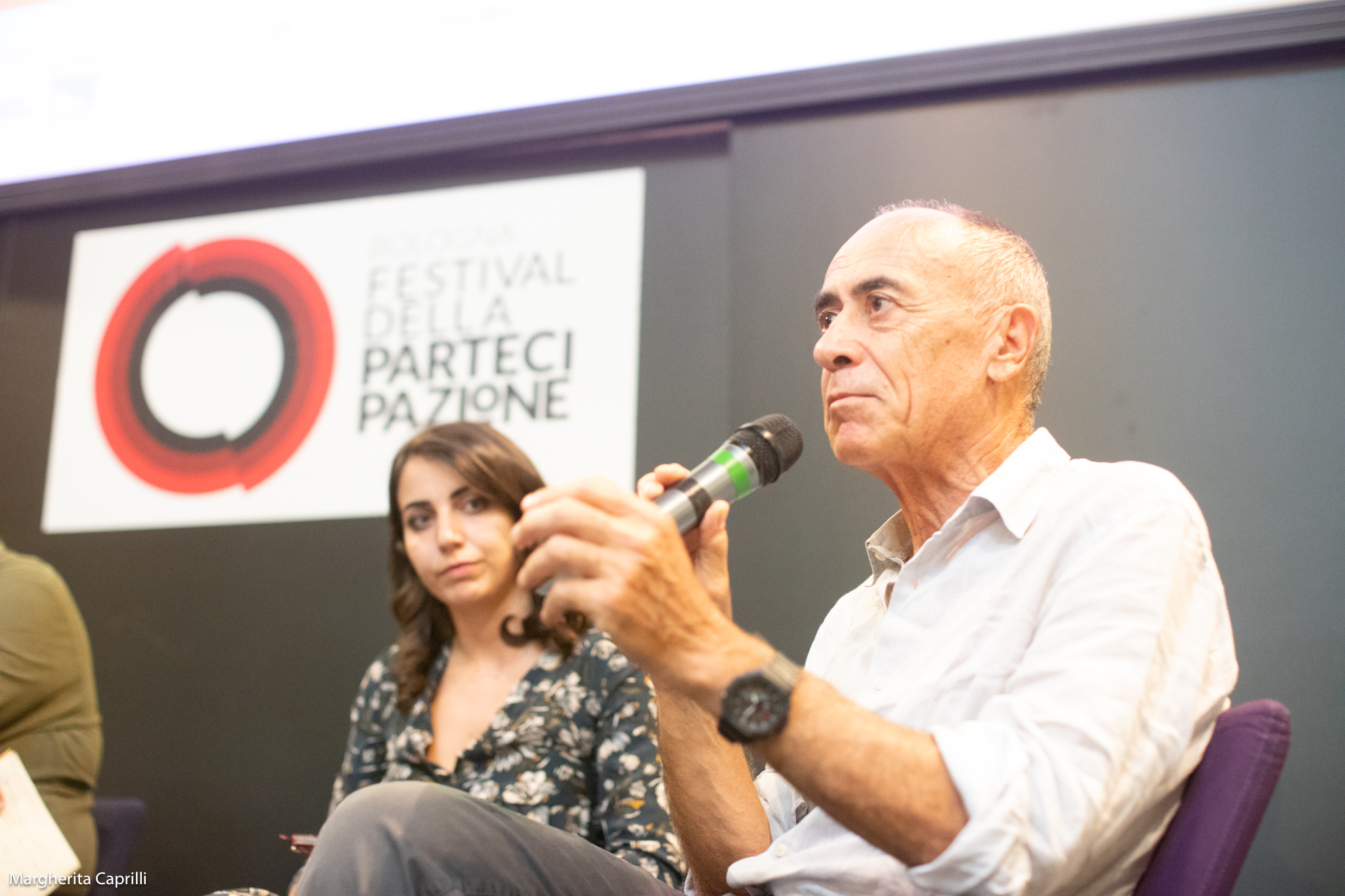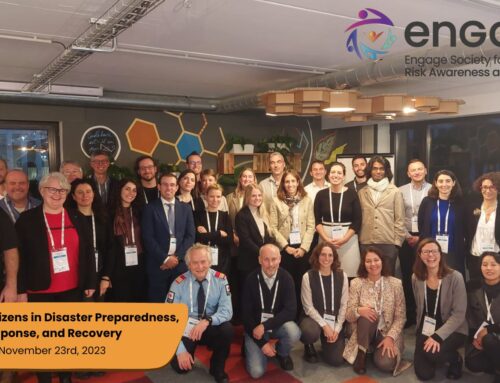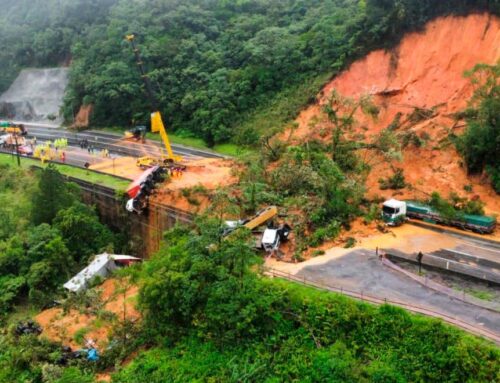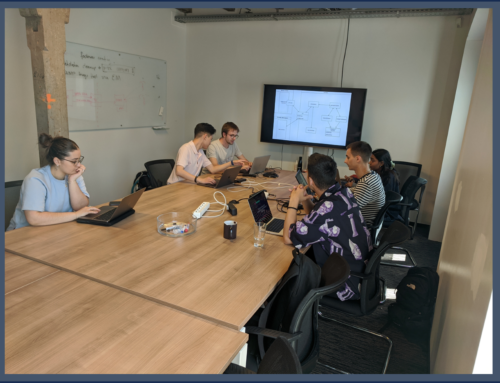Picture credits: Margherita Caprilli
On September 23rd, the ENGAGE project attended the Festival della Partecipazione, an annual Italian event entirely dedicated to citizen participation in the various spheres of democratic life and to facilitating discussion with institutions and NGOs on the spaces for expanding collaboration between the various segments of society. 
ENGAGE brought the debate on community resilience into the Festival arena with a presentation entitled: “Emergencies, managing them with citizens is better” in order to discuss approaches and solutions to make our communities better able to cope with disasters and emergencies.
The event, promoted by Cittadinanzattiva and Deep Blue, involved authorities, first responders, and civil society with the aim of deepening the understanding of the obstacles to the effective involvement of citizens and to identify how an active and aware citizenship can contribute to enhancing the ability of communities to cope with emergencies.
 The discussion began with Irene Priolo, Vice-President of the Emilia-Romagna Region and Vice-President of the Civil Protection Commission of the Conference of the Regions, who recalled the recent floods in the region and underlined the importance of trainings to increase citizens’ knowledge on the management of emergencies: “citizens need to understand and know all aspects of emergency events in order to collaborate and minimize losses and damages.” However, citizens should not be considered only as receivers of information. Anna Lisa Mandorino, General Secretary of Cittadinanzattiva, stressed the importance of recognizing citizens as active participants in emergency management and shared the central elements of collaboration: organised participation, transparency of information and considering citizens as senders of information, not just receivers.
The discussion began with Irene Priolo, Vice-President of the Emilia-Romagna Region and Vice-President of the Civil Protection Commission of the Conference of the Regions, who recalled the recent floods in the region and underlined the importance of trainings to increase citizens’ knowledge on the management of emergencies: “citizens need to understand and know all aspects of emergency events in order to collaborate and minimize losses and damages.” However, citizens should not be considered only as receivers of information. Anna Lisa Mandorino, General Secretary of Cittadinanzattiva, stressed the importance of recognizing citizens as active participants in emergency management and shared the central elements of collaboration: organised participation, transparency of information and considering citizens as senders of information, not just receivers.
The findings of the ENGAGE project confirm the centrality of citizens in disaster management. As explained by Alberto Pasquini and Sonia Matera from Deep Blue, members of the public can have an important role assisting first responders in times of crisis and emergency. Citizens are the first ones on site during / after an emergency, know their territory best and can provide emergency responders with local knowledge. In addition, they have consolidated social relationships with the members of the community, and they are close to citizens in vulnerable conditions, they know and can support them.
ENGAGE findings are reflected in the speech of Titti Postiglione – Deputy Head of the National Civil Protection Department – who shared her extensive experience on emergency  management: “the complexity of emergencies can be enormous and sometimes you can arrive late. The intervention of civil society, which is often more prepared than the complex structure of the authorities, may be necessary. Citizens must be able to communicate with the authorities, because they are more ready but also more prepared, since they know the territory better. In the first 24 hours of the emergency, it is important to establish a relationship of trust with the citizens. After that, immediate physical needs are taken care of. Slowly, it is the citizen who often asks to be the protagonist in emergencies. We must reconcile security with the desire for participation, so that citizens can be protagonists in emergency management”.
management: “the complexity of emergencies can be enormous and sometimes you can arrive late. The intervention of civil society, which is often more prepared than the complex structure of the authorities, may be necessary. Citizens must be able to communicate with the authorities, because they are more ready but also more prepared, since they know the territory better. In the first 24 hours of the emergency, it is important to establish a relationship of trust with the citizens. After that, immediate physical needs are taken care of. Slowly, it is the citizen who often asks to be the protagonist in emergencies. We must reconcile security with the desire for participation, so that citizens can be protagonists in emergency management”.
Antonino La Spina, President of the National Union of Pro Loco d’Italia, agreed on the importance of “being ready and coordinated to systematise all contributions to deal with emergencies and make the response immediate” and confirmed the commitment and support to emergencies of the Pro Loco associations present throughout Italy, recalling their “social role as they keep communities together when separation and isolation can be created between people due to emergencies”.
At the same time, the ENGAGE project reveals that citizens have a strong interest in being prepared and aware, even if they recognize several challenges. Lack of regular training is considered one of the main obstacles preventing citizens from participating in disaster response activities. Most of the training is not localized nor contextualized, it is more theoretical or done just to satisfy the requirements of the law, but they are not useful for them. Lack of knowledge is another barrier, whether this knowledge is about what to do in the case of a disaster, how to act, where to go, who to contact, or knowledge of the organizations that could support in these moments. In addition, non-organised volunteers often lack basic equipment for intervention as well as legal and liability insurance.
The validation exercise on heat waves, carried out in Rome last summer and presented by Maya Battisti of Cittadinanzattiva, showed that a proactive participation involving civil society, first responders and authorities can strongly enhance emergency management by fostering awareness and the adoption of correct behaviour by citizens.
 Emanuele Sirolli’s experiences in Aquila earthquake (2009) and Armando Nanni’s experiences in Amatrice earthquake (2016) were recalling the experience of citizens affected by the emergency. Citizens feel frustrated in their helplessness if they cannot make themselves useful. Participation is a problem (or a burden) for authorities and rescuers. When participation conceives only a passive immobility of citizenship, it generates stress and a lack of trust in institutions.
Emanuele Sirolli’s experiences in Aquila earthquake (2009) and Armando Nanni’s experiences in Amatrice earthquake (2016) were recalling the experience of citizens affected by the emergency. Citizens feel frustrated in their helplessness if they cannot make themselves useful. Participation is a problem (or a burden) for authorities and rescuers. When participation conceives only a passive immobility of citizenship, it generates stress and a lack of trust in institutions.
On this line, two additional experiences of activating citizens in emergencies were heard. Maria Chiara Invernizzi shared her own experience as an earthquake victim (earthquake Central Italy 2016) and the volunteer experience “IononCrollo“. Matteo Bezzi shared his experience as a young Civil Protection volunteer during the Emilia-Romagna floods (May 2023), emphasizing the need to mobilize young civil protection volunteers as resources during emergency crises. Titti Postiglione said that starting from the Covid19 pandemic, it is possible to transform ordinary civil service projects into emergency projects. The National Civil Protection Department is devising a protocol to make this shift automatic: “being equipped and prepared makes the difference, as does adapting in real time”.
In response to their speeches, Francesca Ottaviani, President of the National Committee of Civil Protection Associations recalled the 2018 Civil Protection Code dealing with volunteering and citizen participation and reminds that the pathway for effective collaboration must be built in ‘peacetime’ with the institutions present in the territories. This concept was repeated by Anna Lisa Mandorino’s final remarks: Managing emergencies with the participation of citizens is better, prevention is the most vital and important aspect and must be declined in relational, learning and training processes”.
Listen to some of the voices collected during the event in Cittadinanzattiva’s podcast (from minute 12, in Italian) and explore the results of ENGAGE that were presented during the event: the Knowledge Platform and the heat wave exercise carried out in Rome during the summer by Cittadinanzattiva and ASLRM1.
Authors: Maya Battisti (Cittadinanzattiva), Sonia Matera, and Alberto Pasquini (Deep Blue)





